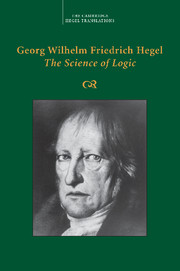Chapter 3 - Ratio or the Quantitative Relation
Published online by Cambridge University Press: 30 September 2021
Summary
The infinity of quantum has been determined up to the point where it is the negative beyond of quantum, a beyond which quantum, however, has within it. This beyond is the qualitative moment in general. The infinite quantum, as the unity of the two moments, of the quantitative and the qualitative determinateness, is in the first instance ratio.
In ratio, quantum no longer has amerely indifferent determinateness but is qualitatively determined as simply referring to its beyond. It continues in its beyond, and this beyond is at first just an other quantum. Essentially, however, the two do not refer to each other as external quanta but each rather possesses its determinateness in this reference to the other. In this, in their otherness, they have thus returned into themselves; what each is, that it is in its other; the other constitutes the determinateness of each. – The quantum's self-transcendence does not now mean, therefore, that quantum has simply changed either into some other or into its abstract other, into its abstract beyond, but that there, in the other, it has attained its determinateness; in its other, which is an other quantum, it finds itself. The quality of quantum, its conceptual determinateness, is its externality as such, and in ratio quantum is now posited as having its determinateness in this externality, in another quantum – as being in its beyond what it is.
It is quanta that stand to each other in the connection that has now come on the scene. This connection is itself also amagnitude; quantum is not only in relation, but is itself posited as relation; it is a quantum as such that has 21.311 that qualitative determinateness in itself. So, as relation (as ratio), quantum gives expression to itself as self-enclosed totality and to its indifference to limit by containing the externality of its being-determined in itself: in this externality it is only referred back to itself and is thus infinite within. Ratio in general is:
1. direct ratio. In this, the qualitative moment does not yet emerge explicitly as such; in no other way except still as quantum is quantum posited as having its determinateness in its externality.
- Type
- Chapter
- Information
- Georg Wilhelm Friedrich Hegel: The Science of Logic , pp. 271 - 281Publisher: Cambridge University PressPrint publication year: 2010

